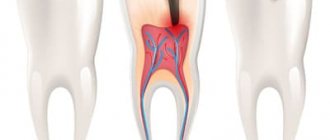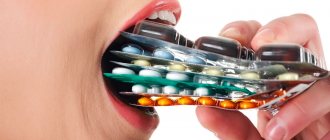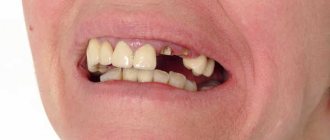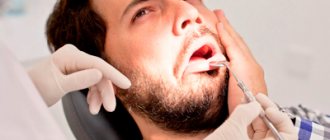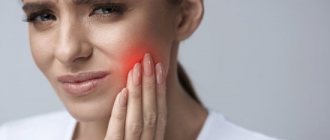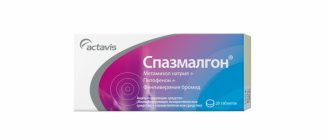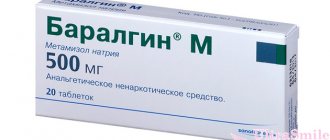Destruction of the tissues that form the crown and root parts of the tooth invariably leads to discomfort, and in more advanced cases – to acute, throbbing or nagging pain. In dentistry, toothache has a special definition – dentalgia or odontalgia. Often the cause of pain can be gum disease, jaw problems, or injuries. Unfortunately, it is not always possible to get an appointment with a dentist at the first signs of discomfort, so you can use tablets for toothache to relieve symptoms and improve your well-being.
It is important to understand that not a single tablet can eliminate the cause of toothache. The only way to cope with dentalgia for a long time is to consult a dentist for therapeutic or surgical treatment.
The choice of a particular treatment method depends on the complexity of the problem and the stage of its development.
By clicking the “request a call” button you agree to the personal data processing policy.
Modern pharmacology offers a wide range of effective drugs that can reduce discomfort caused by progressive dental diseases or injuries. Today, you can buy a variety of medications for toothache in pharmacies. Conventionally, they can be divided into 3 groups:
- NSAIDs (non-steroidal anti-inflammatory drugs)
. As a rule, the source of toothache is an inflammatory process. NSAIDs don't just relieve pain - they relieve inflammation, thereby reducing pain. - Analgesics.
They do not affect the course of the inflammatory process - they eliminate the source of pain by affecting the nerve endings and pain centers in the brain. - Local painkillers
. These are drugs such as lidocaine and novocaine. As a rule, these products are produced in the form of injections, but you can find small aerosol cans with lidocaine on sale - one press and the pain goes away for 30-40 minutes. The main disadvantage of local anesthetics is their strong effect on nearby tissues, which can result in a “cotton tongue” effect, temporary loss of skin sensitivity at the site of exposure, and lack of taste sensations.
As a rule, tablets are the most popular - they are easy to use, and if you choose the right drug, you can use them not only to relieve toothache, but also as an antipyretic, a medicine for migraines, joint pain, etc.
Other medications for toothache
In addition to tablets and capsules, the pharmaceutical industry offers a lot of other drug options that help in the fight against dentalgia:
- Gels.
They are most often used in children during teething. Moreover, such remedies also have an effect in adults during the eruption of wisdom teeth. Among the most popular drugs of this kind are ointments and gels “Cholisal”, “Solcoseryl”, “Dentol”, “Kamistad”, “Metrogil Denta”. - Dental drops.
These are safe, natural preparations made on the basis of natural ingredients, extracts, and essential oils. They have a local anti-inflammatory, calming and analgesic effect. Popular drops - “Dentaguttal”, “Dentinox”, “Dantinorm”, “Denta” - Injections.
These may be conventional drugs for intramuscular administration (Ketonal, Ketorol, Diclofenac), or they may be drugs for point application. Most often, injections are used by professionals for strong pain relief before tooth extraction or treatment (Ultracain, Septodont). - Antibiotics.
It is important to understand here that if a tooth hurts due to the development of caries or pulpitis, then antibiotics are useless (after all, they do not have any effect on the exposed nerve). But if there is a suspicion of the formation of an abscess under the root (obvious inflammation), then it makes sense to take a course of antibiotics (amoxicillin, clindomycin, metronidazole, chloramphenicol, biseptol) for maximum resorption of the accumulated pus. Of course, immediately after this you need to go to your doctor and eliminate the root cause of the pain (treat or remove the tooth). Antibiotics are available in the form of tablets, ointments, and injections. - Sprays and aerosols.
These medications have a local anesthetic effect; simply put, they freeze the tooth. The most popular is Ledocaine spray.
Folk remedies:
- Rinses
Most often, a saline or soda solution is used (1 teaspoon per glass of water), to which you can add a couple of drops of iodine. You can rinse a sore tooth when the first pain appears. - A decoction of sage, chamomile, and St. John's wort for rinsing is also recommended. It is quite simple to prepare: pour boiling water over 1 teaspoon of any of the above herbs, hold in a water bath for 15-20 minutes, strain and cool slightly. Rinsing is carried out as needed to relieve pain with a warm decoction.
- Cooling
. For local anesthesia, you can temporarily apply a piece of ice or something cold to the painful tooth (or rather, to the cheek on the painful side). As a rule, the effect occurs quickly, but does not last long. The main disadvantage of this method is that after applying ice, the pain may disappear for a while, and then return with renewed vigor. - Garlic applications
. Oddly enough, you need to apply garlic not to the tooth, but to the hand (in the place where the pulse is usually felt). The garlic is cut into small cubes or pressed through the garlic, a piece of bandage is placed on the wrist (if this is not done, there is a high risk of a chemical burn from contact of garlic juice with the skin), folded in half or three times, garlic is laid on the bandage, covered with two or three layers of bandage on top. and secure the application. If you have a toothache on the right side, then apply the garlic to your left hand and vice versa.
You can find even more traditional methods in this article.
When a person starts to have a toothache, he is ready to use any means to make it end as soon as possible. Some patients, in the fight against dentalgia, use homeopathic remedies, which, in theory, are designed to cope with the disease. In fact, this makes very little sense: toothache is not a disease, but a symptom of it that needs to be quickly relieved. Homeopathic medicines are intended for long-term treatment, so instead of wasting time and money on useless medicines, it is better to take a tablet of a good painkiller and see a dentist as soon as possible.
What to do if the pills don't help?
It often happens that even after taking strong painkillers, toothache does not subside. This happens for many reasons: advanced caries, pulpitis, severe destruction of the crown, abscess on the root (by the way, practice shows that in this case even local anesthetic injections such as Ultracaine are ineffective). In addition, do not forget about individuality - there are people who are simply not susceptible to the effects of drugs. Also, drugs that affect the nervous system and brain pain centers may not be effective in patients who are in a constant state of stress.
If no pharmaceuticals or folk remedies help, you should not look for a magic pill - you must urgently go to a dental clinic for qualified help.
Effect of the drug
Paracetamol has been considered a popular and sought after pain reliever and antipyretic for half a century. Efficiency is associated with uniform distribution across tissues.
The active ingredients block the action of prostaglandins, which are sources of pain. This eliminates moderate pain. The drug also copes well with fever. This serious symptom can indicate a variety of infectious and inflammatory diseases.
Before taking it, you should consult your doctor and read the instructions to prevent side effects. You should strictly follow the dosage, otherwise complications related to the functioning of the heart and kidneys may occur. The risk increases when taken concomitantly with alcoholic beverages.
Signs of poisoning do not appear immediately. Initially, your general well-being may only slightly deteriorate.
How often can you take painkillers?
Whatever the cause of toothache, you should never abuse painkillers:
There is no universal recipe for taking painkillers for toothache. Each drug is accompanied by instructions that clearly describe the dosage and method of use depending on the nature of the pain, age, weight of the patient, etc.
If we summarize all the recommendations, we can say that taking more than 3-4 tablets a day is not recommended (while strong tablets, such as Nise or Ketanov, it is generally better to take no more than 2 times a day).
Weaker drugs can be taken in larger dosages (1-2 tablets at a time, 3-4 times a day). But, again, if the pain is severe and you have to swallow 8 Paracetamol tablets to cope with it, it is better to take 1-2 tablets of Aertal or Nurofen - the effect will be approximately the same.
When is it used?
At the moment, the pharmacological industry produces quite a lot of medicines based on paracetamol. Among them, the most famous are “Panadol” and “Efferalgan”.
Paracetamol has long been known as an antipyretic and analgesic.
This medicine has two beneficial properties at the same time:
- Antipyretic
- Painkiller – relieves toothache, migraine, headache, pain arising from burns and injuries
Pregnancy pills
Pregnancy is the period when a woman should treat herself with the most care and carefully monitor her health - because the condition of her unborn baby directly depends on this. Therefore, even at the planning stage of pregnancy or at its earliest stages, it is necessary to solve all existing problems in the oral cavity. If for some reason this was not possible, you should prepare for the fact that coping with the resulting toothache will be very problematic:
- During pregnancy, and especially in the first and third trimester, it is prohibited to take any highly effective painkillers (it has been scientifically proven that active substances can penetrate the placenta, causing harm to the unformed body of the unborn baby).
- Hormonal changes that invariably accompany the process of bearing a child can lead to the most unexpected consequences - from unexpected destruction of enamel and gum disease to the manifestation of complete immunity to medications.
That is why, among the drugs approved for pregnant women, doctors name only Paracetamol, Nurofen (in the 1st and 2nd trimester), Analgin (in the 2nd trimester), Airtal (in the 1st and 2nd trimester). All of the above drugs can be used in moderation - 1 tablet per day for no more than 5 days in a row.
Severe toothache in pregnant women is best relieved with safe folk remedies (gargle, ice, garlic).
All of the above also applies to the lactation period. At this time, it is advisable to reduce the intake of any medications to zero, since after absorption into the blood they enter the body of the newborn.
Do not ignore preventive visits to the dentist.
It is enough to visit a specialist 1 – 2 times a year, which will allow you to promptly identify any dental problem at an early stage of development. This means that its elimination will be quick, easy and without complications.
By clicking the “request a call” button you agree to the personal data processing policy.
Tablets for children
As you know, most of all tablets recommended for adults are absolutely contraindicated for children. It is for this reason that it is better not to take risks and choose drugs that are appropriate for the child’s age. Today in pharmacies you can find a huge selection of gels, ointments, analgesic syrups, rectal suppositories that will help cope with childhood dentalgia:
- Cholisal-gel.
- Dentinox gel.
- Children's Nurofen (drops, syrup, tablets)
- Panadol rectal suppositories
- Viburkol rectal suppositories.
The instructions for use in the above-mentioned drugs and their analogues often contain an age limit - from 6 or 12 years. However, on the recommendation of a doctor and in the presence of acute pain, it is permissible to give these medications to children under 6 years of age.
As in the case of pregnant women, children are recommended to use folk remedies to eliminate dentalgia - rinsing, cooling, garlic.
In what cases is it effective?
The drug has an effect in various febrile conditions associated with elevated temperature. Particularly effective for colds.
Paracetamol is able to cope with pain of varying intensity. It is often used for headaches and toothaches. Helps women with pain during menstruation.
The drug is allowed to be taken by pregnant women and babies from 3 months. For children there are baby candles and syrup. The product is often given to babies who are starting to cut their teeth.
Main causes of pain
There can be many reasons why a tooth hurts, but the most obvious of them are the following:
- Caries
. Even almost imperceptible damage to tooth enamel can lead to periodic, barely noticeable pain. If you do not see a doctor in time, the hole will grow, and with it the pain will intensify. After caries reaches its final stage, painful sensations will appear when eating, when cold air enters the oral cavity, etc. - Pulpitis
. Damage to the pulp, which contains numerous nerve endings, invariably leads to regular throbbing pain. - Periodontal diseases
. Damage to the soft and bone periodontal tissues leads to severe inflammation and unbearable pain. - Removal of a tooth
. Despite the fact that the operation is performed under local anesthesia, after the anesthetic wears off, the place where the tooth used to be will be very painful. - Eruption of wisdom teeth
. If they grow evenly, then the person feels only discomfort, which is easily relieved with the simplest painkillers. If not everything goes smoothly with teething (the tooth grows crookedly, rests on the root of the neighboring tooth), then special medications will be required to relieve pain.
Obviously, none of the above problems can be solved by taking pills - only a highly qualified specialist can eliminate the source of pain. The pill is just a way to relieve pain for a short time.
Anti-inflammatory
They help relieve pain, relieve swelling and itching, and reduce bleeding. They are prescribed after dental operations on the gums, after tooth extraction, implantation and other complex manipulations. This is a large group for the complex treatment of diseases with inflammatory and infectious processes:
- Gingivitis. Infection of the oral cavity occurs due to insufficient hygiene due to the accumulation of microorganisms. Bleeding of the affected areas and the development of severe complications are possible.
- Stomatitis is painful inflammation localized on the tongue, cheeks, and gums.
- Periodontitis is a disease that threatens the loss of a fragment of the jaw, with the formation of plaque, stones, and suppuration. It is painful.
- Periodontal disease is the gradual destruction of tissues surrounding and holding the elements of the jaw in their sockets, as well as mucous membranes and bone, causing atrophy, a decrease in bone volume with exposure of tooth roots.
Very popular in this line:
- Metrogyl Denta is a combined antibacterial gel for the treatment of infections of various etiologies.
- Dental, in addition to anti-inflammatory properties, has analgesic and wound healing properties.
- Solcoseryl is most in demand in dental practice. Unlike many others with similar effects, it is a medicine, not a balm, therefore it is often used for candidiasis, viral, traumatic and ulcerative necrotic stomatitis. Accelerates tissue regeneration.
- Cholisal - antimicrobial and analgesic effects. Inhibits the inflammatory process, reduces heat at the site of application.
Prevention of dental diseases
From a very young age, everyone knows what needs to be done to prevent teeth from hurting:
- Regular oral hygiene. You need to brush your teeth thoroughly, morning and evening, using a good toothpaste and brush. During the day, after each meal, you should rinse your mouth thoroughly, ideally using dental floss.
- Visit the dentist twice a year for preventative care.
- Eliminate any foci of infection in the oral cavity in a timely manner and carry out sanitation in a timely manner.
- Do not neglect modern methods of protecting teeth - fluoridation, remineralization, fissure sealing.
In addition, dental health largely depends on what we eat - the diet should include as many fresh vegetables and fruits, fish, and lean meat as possible; Eliminate sugar and sweets as much as possible. Teeth should be protected from mechanical damage, and do not overuse whitening toothpastes.
Author: Elena Grunina Dentist-therapist, endodontist. Work experience more than 9 years. The information is for reference only. Before treatment, consultation with a doctor is necessary.
Rules of application
In order for medications to have the necessary effect, before using them you need to brush your teeth, rinse and dry your mouth thoroughly, and wash your hands with soap. Apply gels and ointments with your finger, rubbing them into the mucous membrane with a light massaging movement. After this, you should not drink or eat for half an hour. The duration of the therapeutic course is determined by the attending dentist, but usually until the inflammatory and other symptoms disappear.
For preventive purposes, you can use herbal preparations and rinsing solutions. Toothpastes that have proven their effectiveness and are recommended by professionals are useful: Lakalut, Paradontax, President. They should be used for prevention for a month, and then take a break.
Expert opinion . Even the best toothpastes are only preventive measures; they can promote healing, but are not a cure, so if any dental ailments appear, you should consult a doctor, and not try to eliminate them with home recipes: they still won’t help, and any disease will is much more treatable in the initial stages.

